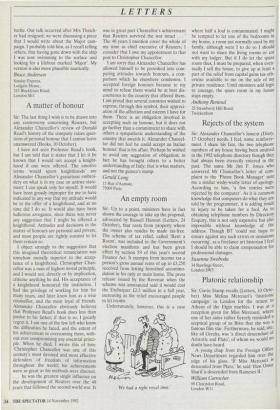A matter of honour
Sir: The last thing I wish is to be drawn into any controversy concerning Reuters, but Alexander Chancellor's review of Donald Read's history of the company raises ques- tions of personal honour that I cannot leave unanswered (Books, 10 October).
I have not seen Professor Read's book, but I am told that it states that I let it be known that I would not accept a knight- hood if one were offered. The emotive terms 'would spurn knighthoods' are Alexander Chancellor's gratuitous embroi- dery on what is in my case an untrue state- ment: I can speak only for myself. It would have been grossly improper for me to have indicated in any way that my attitude would be to the offer of a knighthood, and at no time did I do so. It would also have been ludicrous arrogance, since there was never any suggestion that I might be offered a knighthood. Attitudes and decisions in the matter of honours are personal and private, and most people are rightly content to let them remain so.
I object strongly to the suggestion that this imagined theoretical renunciation was somehow morally superior to the accep- tance of a knighthood. Christopher Chan- cellor was a man of highest moral principle, and I would not, directly or by implication, criticise anything he did. His acceptance of a knighthood honoured the institution. I had the privilege of working for him for many years, and later knew him as a wise counsellor, and the most loyal of friends. Alexander Chancellor obviously believes that Professor Read's book does less than justice to his father; if that is so, I greatly regret it. I am one of the few left who know the difficulties he faced, and the extent of his achievement in overcoming them, with- out ever compromising any essential princi- ple. .When he died, I wrote this of him: `Christopher Chancellor was one of this century's most devoted and most effective defenders of freedom of information throughout the world; his achievements were as great as his methods were discreet. . . . he was the greatest single influence on the development of Reuters over the 40 years that followed the second world war. It
was in great part Chancellor's achievement that Reuters survived the war intact . . . The 40 years I mention cover the whole of my time as chief executive of Reuters; I consider that I owe my appointment to that post to Christopher Chancellor.
I am sorry that Alexander Chancellor has allowed himself to be provoked into com- paring attitudes towards honours, a com- parison which he elsewhere condemns. I accepted foreign honours because to my mind to refuse them would be at best dis- courteous to the country that offered them. I am proud that several countries wished to express, through this symbol, their appreci- ation of the affection and esteem I have for them. There is an obligation involved in accepting such an honour, but it does not go further than a commitment to share with others a sympathetic understanding of the country that awards it. Alexander Chancel- lor did not feel he could accept an Italian honour: that is his affair. Perhaps he wished to avoid any suggestion of obligation; in fact he has brought others to a better understanding of Italy; that is what matters, and not the guinea's stamp.
Gerald Long
15 Rue d'Aumale, 75009 Paris


































































 Previous page
Previous page